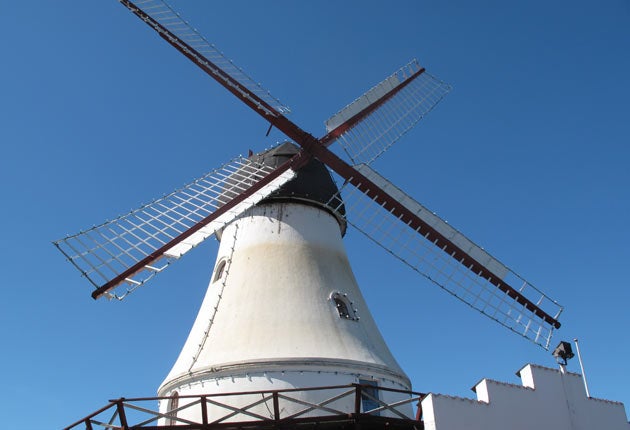Why I was a no-show for the must-sees

Your support helps us to tell the story
From reproductive rights to climate change to Big Tech, The Independent is on the ground when the story is developing. Whether it's investigating the financials of Elon Musk's pro-Trump PAC or producing our latest documentary, 'The A Word', which shines a light on the American women fighting for reproductive rights, we know how important it is to parse out the facts from the messaging.
At such a critical moment in US history, we need reporters on the ground. Your donation allows us to keep sending journalists to speak to both sides of the story.
The Independent is trusted by Americans across the entire political spectrum. And unlike many other quality news outlets, we choose not to lock Americans out of our reporting and analysis with paywalls. We believe quality journalism should be available to everyone, paid for by those who can afford it.
Your support makes all the difference.Skagen, with its rich art, fresh seafood and classic characters, is an utterly delicious slice of Denmark. At least that's what my Lonely Planet book promises. The travel guide is equally glowing about the oldest Danish town, Ribe, describing it as "a must for any visitor to Denmark".
Despite my best intentions, I have visited neither. And here's why. Often, when I turn up at a car-rental office, they do not have the vehicle I have booked; they have a better one, and are effectively obliged to provide a free upgrade. If you, like me, always book the smallest, cheapest car, the only way is up. Or so I thought.
I had booked a cheap hatchback in Denmark and was due to pick it up in the port of Hirtshals after an overnight voyage from Stavanger in Norway. It was a one-way rental through Jutland, visiting hard-to-reach locations such as Skagen and Ribe before dropping it off at Billund airport. But the staff in the rental depot looked surprised when I arrived, and said, "Sorry, we have no cars, your booking is cancelled."
The story was confirmed by the empty forecourt outside and by the UK reservations office, whose computer also said: "No".
"We've got another outlet at Aalborg airport, which is 53 miles away," I was told, "but they haven't any cars, either. Let me give you the number for Customer Service so you can claim a refund." All the while, the Avis logo was smiling at me and promising: "We try harder".
A public holiday in a Scandinavian cul-de-sac was not a good time and place to begin a discussion about how that slogan might be adjusted. Instead, I took a taxi to the station – a fly-driver with nothing to drive. Danish trains, like most things in Scandinavia, are expensive but very good. My planned trio of Skagen, Ribe and Billund airport, though, do not appear on the national rail network.
By the time I got around to calling Avis Customer Service it was 5pm in Britain. A recorded message announced the office was shut. But I did manage to contact Nick Mountfield, the firm's head of marketing. He pronounced himself "baffled" that any Avis customer with a confirmed booking should be turned away. "Find a car, come what may, is our policy," he says – even at a distant Nordic outpost.
All manner of problems can deplete the supply of cars to rent. When this happens, the usual Avis procedure is to find a vehicle from a rival company.
Similar policies are followed by other big multinationals. The leading broker Holiday Autos promises compensation if your car is not available, saying it is "responsible for losses you suffer" if you are let down. But smaller brokers may simply point to the passage in the small print where they say your contract is with the local supplier.
If you have yet to rent a car for the summer, what's the best policy? "Book early," says Nick Mountfield of Avis. Agreed, he would say that. Yet already squeezes on capacity are beginning to show in key resorts this summer: August rates at Mallorca in Spain and Faro in Portugal are nudging €300 for a week, and no doubt plenty of internet chancers are preparing to take advantage of increasingly desperate holidaymakers. So, as they say, I agree with Nick.
The Danish town of Vejle has a pair of problems in luring tourists. First, its name: difficult for Brits to master, and when correctly pronounced as "viler" it sounds like an unfortunate comparative. The other drawback is that the town does not appear anywhere in the Lonely Planet guide, except in a passing reference about bus connections to Billund airport – which is how I came to be there.
For every bad travel experience, an equal and opposite one is waiting to happen. With time to spare at Vejle, I discovered a modest gem of a town. A windmill – about to open to visitors for the summer – presides over the town from high on a leafy hill. The church of St Nicholas has the peat-preserved body of a woman who lived before Christ. And the local art museum has a remarkable self-portrait of Rembrandt as part of its formidable collection of etchings by the Old Master, all under lock and key until you ask to see them. Sometimes the best sights are concealed.
To view Simon Calder's film about Vejle, go to independent.co.uk/vejle
Join our commenting forum
Join thought-provoking conversations, follow other Independent readers and see their replies
Comments